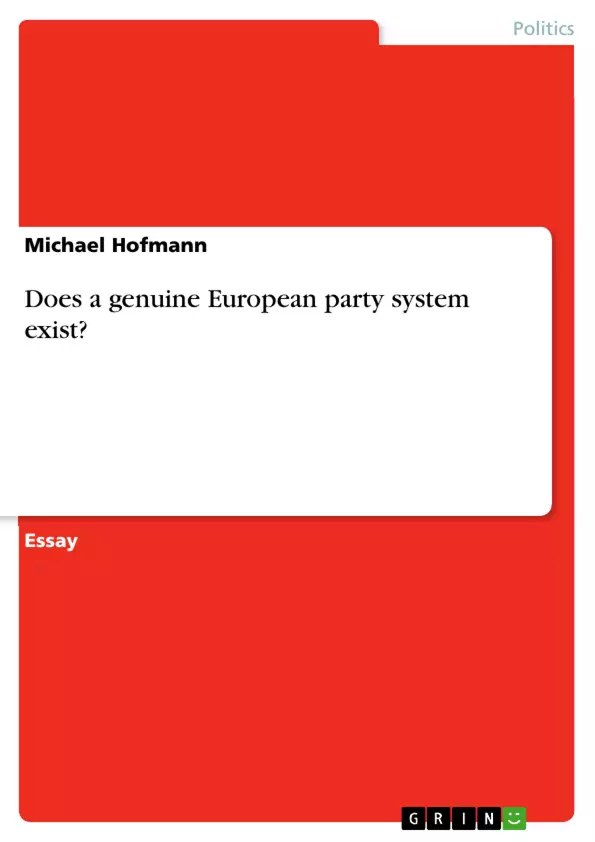Political Parties play a crucial role in modern democracies as they form and articulate the political will of the citizens of a nation and represent their interests.
This significance is also acknowledged within the European Union where they exert already a great influence in all European institutions. The European Council, the Council of Ministers as well as the Commission are mainly constituted of “senior party figures”. “All political parties that are members of a national governing coalition are automatically sucked into the management of the Union.” However, political parties do not dispose of the same resources and support than they do at national level. This is, for instance, sensible looking at the very low turnout rates in elections for European Parliament and opinion polls reflecting little identification with European parties. National party elites often neglect or avoid European issues during the campaigns in favour of domestic issues.
But since the process of European Integration and Enlargement is proceeding, there arises the need to enhance a genuine European party system. It is widely acknowledged among European politicians that the institutional, legal and also actual power of European political parties did not keep pace with this development and need to be extended, as they are “intermediators between society and government” and even “political entrepreneurs of effective liberal democratic systems”.
This paper deals with the question, whether a genuine European party system exists, or respectively why it does not exist (already). Such a party system comprises Euro-parties, party groups in the EP, their coalitions and national delegations within the groups. To cover all the aspect would, however, go beyond the scope of this paper. Therefore, focus is put on the Euro-parties. First, the notion of party systems in general will be explored and then the legal framework of Euro-parties against the background of the reform process of the European Parliament pointed out. Further on, I will analyse the existing party families and Euro-parties. The working paper delivered by Stoiber will be of help in this respect. In a following chapter, the impact of European integration in regard to national parties and citizens is going to be set out. Finally, I shall draw a conclusion and eventually give an outlook for a future European party system.
Inhaltsverzeichnis (Table of Contents)
- Introduction
- Party Systems and the Legal Framework of European Parties
- Party Families and the Formation of European Parties
- National Parties and EU-Citizens in the Transnational Party System
- Conclusion
- Sources and References
Zielsetzung und Themenschwerpunkte (Objectives and Key Themes)
This paper aims to explore the existence of a genuine European party system. It examines the historical development and current state of Euro-parties, party groups within the European Parliament (EP), and their role in European integration.
- The concept of party systems and their legal framework in the context of the European Union.
- The formation of European parties and the influence of party families.
- The impact of European integration on national parties and EU citizens.
- The role of Euro-parties in promoting European awareness and representing the political will of EU citizens.
- The challenges and opportunities for a future European party system.
Zusammenfassung der Kapitel (Chapter Summaries)
- Introduction: This chapter introduces the topic of European party systems and their significance in the context of European integration. It highlights the growing influence of political parties in European institutions, while also noting the challenges faced by Euro-parties, such as low turnout rates and limited identification among EU citizens.
- Party Systems and the Legal Framework of European Parties: This chapter delves into the theoretical background of party systems and their legal framework in the European Union. It discusses the development of European parties from the Common Assembly of the European Coal and Steel Community to the present day and examines the legal framework provided by the Treaty of Maastricht and the Treaty of Nice.
- Party Families and the Formation of European Parties: This chapter explores the formation of Euro-parties and their relationship with party families. It examines the role of these families in shaping the political landscape of the European Union. The Stoiber working paper is utilized as a resource in this analysis.
Schlüsselwörter (Keywords)
The paper focuses on European party systems, Euro-parties, party groups in the European Parliament, European integration, party families, national parties, EU citizens, political will, European awareness, and the legal framework of European political parties.
Frequently Asked Questions
Does a genuine European party system exist?
The paper explores whether Euro-parties and party groups in the European Parliament constitute a real system or if they remain secondary to national parties.
What are Euro-parties?
Euro-parties are transnational political organizations that operate at the EU level, representing different party families across member states.
Why is voter turnout low in European elections?
The study suggests that national elites often focus on domestic issues during campaigns, leading to low identification with European-level parties.
What is the legal framework for European parties?
The legal basis was established and expanded through the Treaties of Maastricht and Nice to enhance the role of parties in European integration.
What are "party families" in the EU context?
They are groupings of national parties with similar ideologies that form the basis for the transnational Euro-parties and EP groups.
- Arbeit zitieren
- Michael Hofmann (Autor:in), 2004, Does a genuine European party system exist?, München, GRIN Verlag, https://www.grin.com/document/76376



